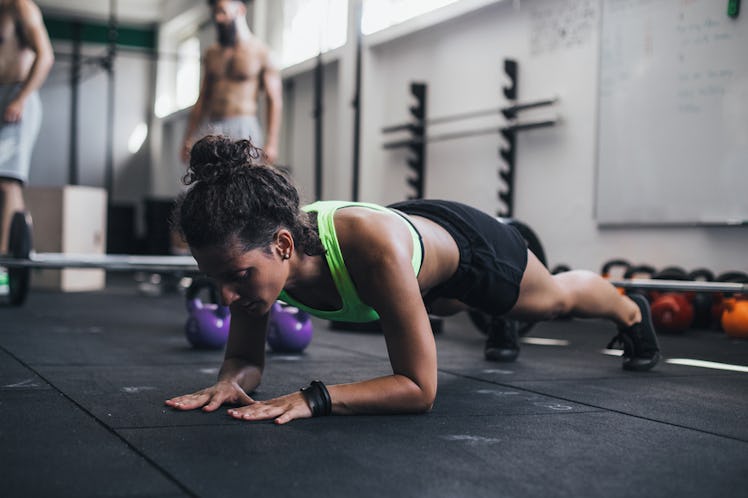
Holding A Plank For A Minute May Be Pointless, So Here's What You Should Do Instead
Last week, my brother told me he can hold a plank for three minutes, and ever since, I've been dedicated to working on my own planking skills (TBH, I think I just hate feeling weaker than a man, but that's another story for another day). Sadly, I've been stuck at the two-minute mark for a while, because I can't seem to make it past that point without my knees buckling, or feeling a weird, shooting pain radiating throughout my elbows. I mean, really, how long should you hold a plank for? Is a three-minute plank actually more effective than a minute-, even 30-second plank, or am I just letting my competitive side get the best of me?
If you've ever tried to hold a plank for longer than your own personal record, then you've probably experienced that moment when your core feels like it's literally being set on fire, and your biceps are trembling under the pressure of, you know, just your entire body. It's that moment when your left eye starts twitching, and you longingly gaze at your iPhone stopwatch, willing the seconds to go just a little bit faster.
Sound familiar? Well, I have good news, friend: Gritting your teeth and sweating your ass off to hold a longer plank may not make such a huge difference in terms of improving your strength, The Telegraph reports.
In fact, according to the outlet, you might be able to get away with a measly 10-second plank.
OK fine, just 10 seconds probably isn't long enough on its own, but according to Stuart McGill, Ph.D., a spine specialist and professor at the University of Waterloo in Canada, three quick sets of 10-second planks is the "ideal" way to go. He told The Telegraph there's basically no point in trying to hold a plank for minutes at a time, and "holding repeated holds of 10 seconds is best for the average person." Bless the f*ck up, y'all.
And it's not just McGill who suggests this, BTW. Albert Matheny, R.D., C.S.C.S., co-founder of SoHo Strength Lab and advisor to Promix Nutrition, told Women's Health you can plank until you're blue in the face, but ultimately, you really shouldn't be concerned with how long you can hold this total-body strengthening posture. What actually matters, Matheny told the outlet, is "keeping perfect form," and only holding the plank for as long as your body can take it.
So, I mean, if you can hold a plank for a long-ass time without starting to violently trembling, go forth and conquer that sh*t, friend. But if your back is starting to sag and your shoulders are begging for mercy after even just 10 or 15 seconds, as Queen Elsa of Arendelle wisely says: let it go.
People who strive to hold a plank for longer periods of time — like me, ugh — often put quantity over quality, which can lead to unnecessary strain on the body, and potentially even serious injuries down the road.
When you're not focusing on your form, you can place unnecessary stress on your elbows, wrists, or spine, not to mention you're probably not providing your core muscles with any sort of challenge at that point, which is really the whole idea of the exercise, right?
Make sure your planks are a "high-tension move," which essentially means you're really engaging your glutes and rotating your pelvis upward while you're in the position, Austin Lopez, C.S.C.S. and owner of Ausome Fit, told POPSUGAR. Once you learn how to challenge your body effectively for shorter periods of time, you'll start to see your strength getting better and better, and your poor elbows will definitely thank you for showing them some mercy (finally).
Oh, and since you won't be wasting your time on pointlessly extending your plank duration any longer than it should be, you can focus on adding some fun plank variations into your workout routine to spice things up (after all, planks are still pretty boring — I get it). To keep things interesting on the mat, try adding some side planks, plank hip dips, and, if you're ready for it, a couple of wild one-armed planks into your workout routine to really put your fitness to the test, and start developing some real planking skills.